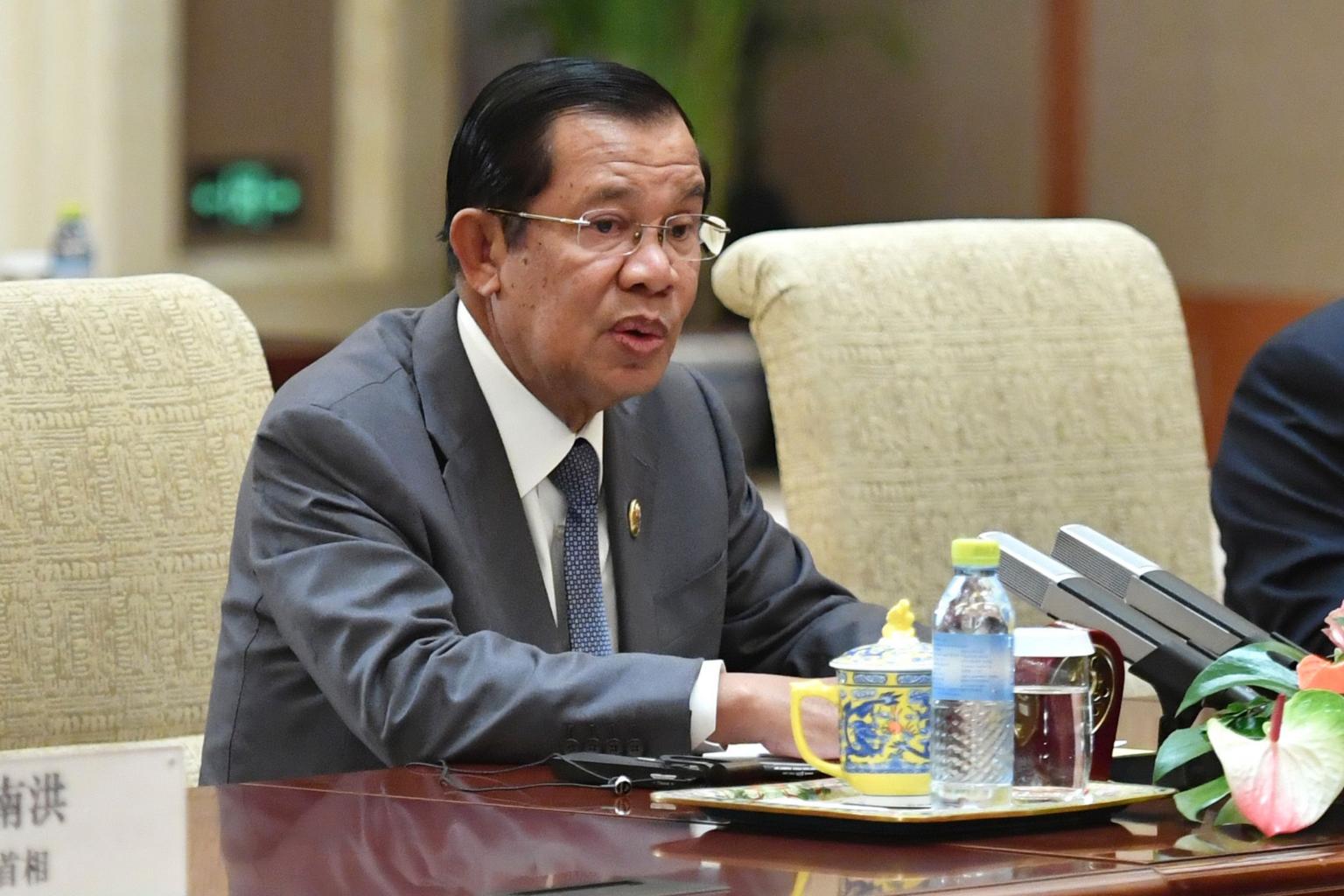Cambodian Prime Minister Hun Sen accuses Singapore of supporting genocide
Sign up now: Get insights on Asia's fast-moving developments

In a Facebook post on June 6, 2019, Cambodian Prime Minister Hun Sen (above) said he deeply regretted Singapore PM Lee Hsien Loong's remarks.
PHOTO: AFP
Follow topic:
PHNOM PENH/HANOI/SINGAPORE - Cambodian Prime Minister Hun Sen has accused Singapore Prime Minister Lee Hsien Loong of supporting genocide because of his comments about Vietnam's 1978 invasion of Cambodia which ended Pol Pot's genocidal "killing fields" regime.
In a Facebook post late on Thursday (June 6), Mr Hun Sen said he deeply regretted Mr Lee's remarks, a Reuters report said.
"His statement reflects Singapore's position then in support of the genocidal regime and the wish for its return to Cambodia," Mr Hun Sen said.
Singapore "had indeed contributed to the massacre of the Cambodian people", he said.
The Vietnamese invasion ended Pol Pot's three-year Khmer Rouge regime which led to the deaths of almost two million people.
Mr Hun Sen was a junior member of the Khmer Rouge but fled to Vietnam when the group split. He returned with the Vietnamese army that intervened in late 1978 to oust the Khmer Rouge and rose to power in a government set up by Vietnam.
In his comments, Mr Hun Sen also said PM Lee's comments were an "insult to the sacrifice of the Vietnamese military volunteers who helped to liberate Cambodia".
Last Friday, Mr Lee wrote on Facebook that he had written to Thailand's Prime Minister Prayut Chan-o-cha to express his condolences on the death of former Thai premier and Privy Council president Prem Tinsulanonda on May 26.
In praising Mr Prem's capabilities as a leader, PM Lee said the former leader's premiership coincided with the then five Asean members - Thailand, Malaysia, Indonesia, the Philippines and Singapore - coming together to oppose "Vietnam's invasion of Cambodia and the Cambodian government that replaced the Khmer Rouge".
He said Thailand was on the front line, facing Vietnamese forces across its border with Cambodia, and that Mr Prem was resolute in not accepting this fait accompli and worked with Asean partners to oppose the Vietnamese occupation in international forums.
As a result, PM Lee said, this prevented the military invasion and regime change from being legitimised, as well as protected the security of other Asean countries.
PM Lee also mentioned the issue during his keynote address at the Shangri-La Dialogue last Friday, when he was talking about the formation of Asean.
Cambodia and Vietnam have objected to PM Lee's remarks.
Cambodian Defence Minister Tea Banh told local media earlier this week that PM Lee's comments were "unacceptable" and "not true".
He said he had brought up the matter with his Singapore counterpart Ng Eng Hen, and requested that Dr Ng tell PM Lee to rectify the statement. "He (PM Lee) did not say the truth and his statement does not reflect history. It is not true because he said Vietnamese troops invaded Cambodia," Khmer Times quoted the Cambodian minister as saying. "We wish for him to make corrections. It is not true."
Vietnam's Ministry of Foreign Affairs said it "regretted" that Mr Lee's remarks did not "objectively reflect the historical truth" and, as a result, caused "negative" impact on public opinions.
The ministry's spokesman Le Thi Thu Hang said the ministry has discussed this issue with its Singapore counterpart. She added that the contributions and sacrifices of Vietnam in the joint efforts with the Cambodian people to end the Khmer Rouge genocide regime have been widely recognised.
PM Lee's post on Mr Prem attracted some 26,000 comments, with many that appeared to be from Vietnamese users expressing their unhappiness over his comment on the Vietnam-Cambodia issue.
In contrast, there were posts of support from users with Cambodian names, such as one Sophanna Nun, who wrote: "Thanks for telling the truth even if it hurts a lot of people. You are great leader."
In a 2011 speech, former deputy prime minister Wong Kan Seng had described the Cambodian issue as one of Singapore's early tests as a country.
Giving the Fourth S. Rajaratnam Lecture organised by the Ministry of Foreign Affairs Diplomatic Academy, he said: "The invasion of a smaller country by a larger neighbour, the deposition of a legitimate government by external force and the imposition of a proxy by a foreign power became a direct challenge to the fundamentals of our foreign policy."
Mr Wong said Singapore had to respond to the invasion, or it "would have undermined our credibility and posed serious implications for our own security".
"We had no sympathies for the Khmer Rouge regime. It was an issue of principle," he added.
Vietnam withdrew its forces from Cambodia in late 1989 and a 1991 treaty officially ended the war.
Vietnam joined Asean in 1995 while Cambodia joined in 1999.

